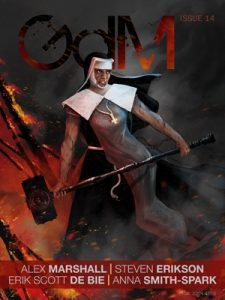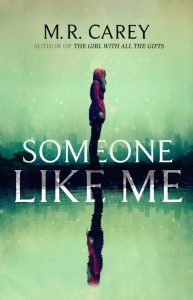Adrian Collins's Blog, page 235
July 3, 2019
REVIEW: The Rage of Dragons by Evan Winter
The inhabitants of Omehi who are known as the Chosen have been warring with the savage hedeni tribes for hundreds of years. The hedeni may have superior numbers but the Chosen have the Gifted. These are powerful female mages who can source power from the underworld Isihogo. The Gifted are a huge asset in battles. They can turn a warrior into an Ingonyama which is a giant, amazingly powerful protective being. The pinnacle of their powers, and the aspect that the hedeni fear the most is that when Gifted work together they can call a Dragon Guardian to aid them on the battlefield to bloody and devastating effect.
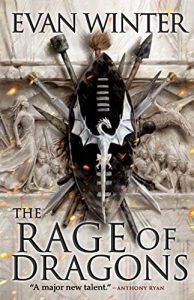 After an incredible prologue which is set 186-cycles prior, we spend The Rage of Dragons mostly following Tau’s third person perspective. Castes and birthright are hugely important in this novel and Tau is a higher common. He lives in a relatively small town and spends the majority of his days helping his father in his duties or training with the sword. His father was an Ihashe warrior and now helps keep the settlement secure and safe. Tau wants to follow in his father’s footsteps and become an Ihashe soldier too. These are the elite fighters from the lesser castes. He spends his days practicing with the second son of a petty noble house called Jabari. As a noble Jabari is bigger, stronger, faster, fitter and beats Tau the majority of the time. Jabari wishes to join the Indlovu which is the group for the most powerful noble caste warriors. Although best friends they are aware that their blood will lead them to walk different roads in the future even though the nobles, commoners, and the drudge are all on the same side. All seems content and life doesn’t seem too harsh. Tau even has a love interest in his village called Zuri. Things change dramatically but mostly for Tau the day that Jabari attends his warrior trials and that where the story really begins.
After an incredible prologue which is set 186-cycles prior, we spend The Rage of Dragons mostly following Tau’s third person perspective. Castes and birthright are hugely important in this novel and Tau is a higher common. He lives in a relatively small town and spends the majority of his days helping his father in his duties or training with the sword. His father was an Ihashe warrior and now helps keep the settlement secure and safe. Tau wants to follow in his father’s footsteps and become an Ihashe soldier too. These are the elite fighters from the lesser castes. He spends his days practicing with the second son of a petty noble house called Jabari. As a noble Jabari is bigger, stronger, faster, fitter and beats Tau the majority of the time. Jabari wishes to join the Indlovu which is the group for the most powerful noble caste warriors. Although best friends they are aware that their blood will lead them to walk different roads in the future even though the nobles, commoners, and the drudge are all on the same side. All seems content and life doesn’t seem too harsh. Tau even has a love interest in his village called Zuri. Things change dramatically but mostly for Tau the day that Jabari attends his warrior trials and that where the story really begins.
Tau was a standard and safe character at the beginning of the narrative but his development throughout is dramatic and very well done. He changes drastically when vengeance becomes his only real motive. Following his loss, taking part in his warrior trials, to his time in Scale Jayyed as an initiate Ihashe, seeing events from Tau’s perspective was addictive for me. He was headstrong, unyielding, sometimes made bad decisions and wasn’t always likable which are some of the qualities I look for in a protagonist.
He made a pact with himself, a pact he swore on his father’s soul. If he were asked to run a thousand strides, he would run two thousand. If he were told to spar three rounds, he would spar six. And if he fought a match to surrender, the man who surrendered would not be him. He would fight until he won or he died. There would be, he swore, no days without difficulty.
I’ve read many fantasy novels where sections take place at a warrior or magic educational establishment. This tale features some of what you’d expect in this sort of setting. Rivals, different factions, a team of varied individuals working together against the odds, camaraderie, interesting teachers/trainers, etc… The familiar elements incorporated, I think this is the most I have ever enjoyed reading a story that features a warrior school. That includes Anthony Ryan’s Blood Song which is probably the closest rival this story has. What made this exceed was the practice battles against other scales from the lesser castes and also from the noble castes. The hatred between the nobles and the lessers leads readers to realise that there is no such thing as a practice fight in this environment. These scenarios are exceptionally well crafted and gripping especially when Tau hones his fighting skills and other members of his team learn to work together expertly to overcome much adversity.
Winter has a deft talent for writing colourful, complex and memorable characters. My personal favourites were sword trainer Jayyed, love interest Zuri, hated rival Kellan, and all the members of Jayyed’s five. This African-influenced fantasy world was composed well without being too flowery or unnecessarily over detailed. This kept the focus on the action and The Rage of Dragons flows at a breakneck pace with only a few quieter, slower chapters here and there for readers to catch their breath, compose themselves, reflect on what has just happened and then breathe before going again. The Rage of Dragons features the battle scenarios as mentioned but also huge skirmishes and fights against the age-old enemy, the hedeni. Duels, political corruption, dragons and venturing to the underworld to fight demons are just a small amount of the ingredients which make The Rage of Dragons such a phenomenal debut. I’ll definitely see what Winter has in store for us in his next entry. The Rage of Dragons is an excellent high-octane thrill ride of a fantasy debut that I devoured in one day. Highly recommended.
Purchase The Rage of Dragons by Evan Winter
The post REVIEW: The Rage of Dragons by Evan Winter appeared first on Grimdark Magazine.
REVIEW: The Armored Saint by Myke Cole
The Armored Saint is a novella from Myke Cole (Shadow Ops) and the beginning of his fantasy trilogy, The Sacred Throne. The publication seems to be part of Tor’s novella series, but at 208 pages, it reads more like a short novel than a novella. No matter what you call it, though, Cole makes the format work exceptionally well with tight prose, a close third-person single narrative, a condensed story world, and intense conflicts all stuffed into a smaller-than-door-stopper package. As most readers are aware, there is not enough time to read all the great fantasy and sci-fi available, and I have been wanting to read some of Cole’s highly regarded Shadow Ops series, but never got there. So I was glad to be given a chance to read and review the beginning of this new series, which looks to be a good one.
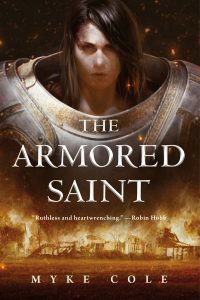 The Armored Saint follows the story of Heloise, a teenage girl living in a quasi-medieval village on the outskirts of an extremely oppressive empire under the rule of the religious Order and their Holy Writ. The job of the order is summed up in one line from the Writ: “Suffer no wizard to live.” The Order gallops around from village to village dispensing brutal justice on anyone suspected of wizardry or any village suspected of harboring a wizard. The Order is relentless and, even worse, accountable only to themselves. True to the short-form novel, Heloise and her father, Samson Factor, encounter the Order in the story’s first chapter. They stop Heloise and her father on the road. The effect is truly frightening, setting the mood for the entire story, and the hook, the inexorable, gripping, frightening conflict, of the story is set, never to let go.
The Armored Saint follows the story of Heloise, a teenage girl living in a quasi-medieval village on the outskirts of an extremely oppressive empire under the rule of the religious Order and their Holy Writ. The job of the order is summed up in one line from the Writ: “Suffer no wizard to live.” The Order gallops around from village to village dispensing brutal justice on anyone suspected of wizardry or any village suspected of harboring a wizard. The Order is relentless and, even worse, accountable only to themselves. True to the short-form novel, Heloise and her father, Samson Factor, encounter the Order in the story’s first chapter. They stop Heloise and her father on the road. The effect is truly frightening, setting the mood for the entire story, and the hook, the inexorable, gripping, frightening conflict, of the story is set, never to let go.
While some, perhaps many, longer novels sag in the middle, get muddled down with seemingly irrelevant subplots, long descriptions, and/or episodic events, The Armored Saint has no time for bullshit. The story races along like a forest fire. When Heloise sees her friend murdered by the Order in a horrifying “Knitting” of a nearby village, she is determined to fight back. She is joined by her village who are fed up with the oppressive Order and skeptical about its intentions. Only Heloise knows the real secret that need to be protected from the Order to save her friends and family. But does she really know everything she thinks she knows? There are twists and turns aplenty, especially for such a short novel, and as should be expected, the whole fucking thing blows up in an explosive, magical, and pleasantly unexpected climax.
Cole’s prose is fast and direct. There’s no space for self-indulgence here; the author/narrator almost disappears behind Heloise’s thoughts and actions. Characters’ voices, dialogue, and language are consistent and diacritical, which helps create a distinct feeling for the culture of these villagers without the need for a lot of exposition. Cole also uses dialogue to move the story along briskly while adroitly avoiding info-dumping. The effect is a very fast moving tale, full of energy, excitement, and the type of character depth one would expect from a full-length novel. It’s not perfect, though. Heloise’s mother, Leuba, who appears sparingly in the story, is particularly without description or voice, a mere placeholder for a character, but that’s part of the tradeoff between a lengthy tome and a densely packed short novel.
Despite its short form, The Armored Saint is replete with thematic significance. Readers must ask themselves what rights do authorities have to govern people in extremely dangerous situations, a theme that seems extremely compelling given the expanding role of government in the so-called War on Terror. The nature of forbidden love and sexual attraction is called into question as well, with surprising results. Loyalty is another significant theme that drives the action in The Armored Saint: at what point are family ties in conflict with the good of society? Of course, the role of sexuality and gender in a male-dominated society is also explored. Are women worthy of traditional male roles in society, and why must it always be men who raise them to such positions (with the highly significant exception of Kameron Hurley’s The Stars are Legion—see review in GdM #11)? These are complex questions that are significant both in fiction and with regard to the resurgence of a global women’s movement.
Heloise joins a seemingly rising number of young, tough-as-nails female protagonists written by male authors in grim fantasy, including Nona from Mark Lawrence’s Red Sister, Thorn from Joe Abercrombie’s Half the World, and Pyrre from Brian Staveley’s Skullsworn. And Heloise is not alone in this story. She has other female friends, which separates The Armored Saint from a lot of old school fiction that features female characters who only relate to male characters, like the nearly non-existent female characters in The Lord of the Rings and the powerful but isolated female characters in A Game of Thrones, which shows that male writers are starting to “get it”: women are literally Half the World. I wonder if Heloise will continue to be the featured protagonist of The Sacred Throne trilogy; I can think of no reason why she shouldn’t. She is a complex, flawed, sympathetic character with huge balls… uh… I mean, gonads. If anything, she might be too ‘good’.
Which brings us to the big question. The Armored Saint is billed by its publisher as the start of “a new epic fantasy trilogy.” It remains to be seen how grimdark purists will receive it. Heloise and her father are ‘good’ people; there can be little argument about that. Because this is only the first entry in a trilogy, we cannot know yet if good will triumph over evil, but I expect it will. However, even though I enjoy grimdark as a favorite subgenre (IMHO) and love the morally grey sentiments that are central to it, I am very much looking forward to revisiting these complex characters and this terrifying world in the next installment in this gritty, dark, brutal, grim, fearsome but perhaps merely ‘epic’ series. Highly recommended.
The Armored Saint is expected to be released by Tor.com Books/Tom Doherty Associates on Feb 20, 2018. Our thanks go out to the publishers for sending us an advance copy.
Purchase a copy
Originally published in Grimdark Magazine #14.
Grimdark Magazine #14 is available for purchase from our catalogue.
The post REVIEW: The Armored Saint by Myke Cole appeared first on Grimdark Magazine.
June 25, 2019
ANNOUNCEMENT: GdM Appoints New Cover Artist
When he left, Jason Deem walked away and left a huge hole in our ranks. We went through a pretty big process to come up with a new artist, including a Patreon poll to make sure we got the artist our fans wanted. And then came Carlos Diaz, who has blown us away with the opportunity his ability presents.
There are a few things that made us pick Carlos, but primarily these are the images that made us partner with this brilliant artist. I’m sure you’ll agree with his potential. Check it out below, and I’m sure you’ll agree we’re all very excited with what Carlos will come up with in Issue #20 with our October 1 2019 issue.
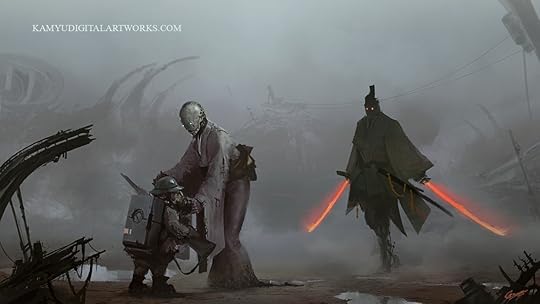




The post ANNOUNCEMENT: GdM Appoints New Cover Artist appeared first on Grimdark Magazine.
REVIEW: Limited Wish by Mark Lawrence
I read One Word Kill a few weeks ago and was thrilled to get hold of an eARC of the sequel, Limited Wish.
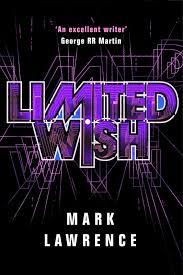 If you liked book one, prepare to be just as entertained an engrossed with book two. The good news is that this book doesn’t suffer at all from “middle book syndrome” where the bridge from beginning to end of a trilogy often becomes the weakest link. Indeed, this is just as good if not better than the first book.
If you liked book one, prepare to be just as entertained an engrossed with book two. The good news is that this book doesn’t suffer at all from “middle book syndrome” where the bridge from beginning to end of a trilogy often becomes the weakest link. Indeed, this is just as good if not better than the first book.
Limited Wish picks up a few months after the events of One Word Kill, as our party of adventurers settles back into their daily lives. Our narrator, Nick, has turned 16 and worked his way into admission at Trinity College in Cambridge, working as a protégé to a Professor in Mathematics. They’re working together on ideas with bending time, as Nick is convinced by his experiences in book one that he eventually invents a method of time travel.
As in book one, Nick and his friends get together each week to play their Dungeons and Dragons campaign. The book’s title reflects that, with the Limited Wish spell being one that has wondrous benefit but obvious limitations on it. It’s all in the wording of the wish. The campaign story runs parallel to our main story, where Nick is once again dealing with visitors from the future and having to avoid time paradoxes.
This time around, Lawrence ups the stakes from the first book. Nick still has the shadow of leukemia to haunt him and threaten to end his future before he can move to set it back to what it was, or is, supposed to be. We see that there are many alternate realities and possibilities, and Nick is determined to make sure that his reality is one where he isn’t killed by such things as his leukemia or the simple fact of the universe seeming to be out to kill him with random accidents. If that’s not enough, Nick and his friends are dealing with the aftermath of the events in book one, where they know certain parts of their futures and are dealing with the questions of how set in stone they are or if their current actions will change things up and create a Butterfly Effect.
This isn’t a rehash of the first book, but a deeper study into time bending and alteration, and the paradoxes that are formed when it’s attempted. At the centre of these ideas is the “time hammer”, which Nick will need to employ at a precise moment of convergence in order to set things “right”. It’s a bit of a mind twister for both Nick and the reader, but Lawrence pulls it off in ways that make sense scientifically and make sense to the layman reader.
I’m recommending the Impossible Times trilogy as one of the top reads of 2019, and very much looking forward to the conclusion in November. I can see this series down the road as an essential re-read, as there will be lots of little things to snap into place the second time around. Perhaps the time hammer will make elements click that might have been overlooked with the first reading.
The post REVIEW: Limited Wish by Mark Lawrence appeared first on Grimdark Magazine.
June 22, 2019
REVIEW: One Word Kill by Mark Lawrence
Though I often read more than one book at a time, I generally keep to a rule that I have for myself which prevents me from reading multiple books by the same author. With One Word Kill, I made an exception. My current audiobook is Holy Sister, also by Mark Lawrence, but since it is such a different genre and setting, I didn’t think it would be a problem. I was correct, as the only thing that carried over into this book was Lawrence’s great storytelling.
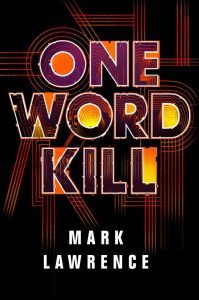 Nick is a teenager that just wants to get through school and get to the weekends when he can enjoy the D&D (Dungeons and Dragons) sessions he has with a small group of friends. He might even be interested in kissing a girl, but that comes later. At the beginning of our story, Nick has learned that he has leukemia, and the prognosis isn’t that great. Talk about a chilling way to end the first paragraph of the novel:
Nick is a teenager that just wants to get through school and get to the weekends when he can enjoy the D&D (Dungeons and Dragons) sessions he has with a small group of friends. He might even be interested in kissing a girl, but that comes later. At the beginning of our story, Nick has learned that he has leukemia, and the prognosis isn’t that great. Talk about a chilling way to end the first paragraph of the novel:
“As unwilling to speculate as he was, I think even Dr. Parsons would have assured me that the cancer would give me the next four weeks. But as it turned out, I would die even before February got into its stride.”
Wow! Right there Lawrence hooks and scares his readers from the first. But of course, we want to know what happened next, and how Nick is narrating this story.
Before long, we’re getting right into the meat of the game, which has a storyline with parallels to what happens to the group in the real world. We soon learn the significance of the book’s title and see how it relates to both the game and the struggles that our characters face through the course of learning of Nick’s cancer and dealing with other social issues that plague the group. Nick’s perspective is changed through the book as he starts to look at the world differently, knowing that his time may very well be limited.
From reading reviews, I’ve seen that this book is sometimes described as Stranger Things meets Ready Player One. As far as tone, I would agree, but for content not as much. I do see the definite Stranger Things parallel, as we have a small group of teenagers getting together to play their D&D game each week, and weird stuff happens that run in sequence alongside the D&D campaign. But other than the first-person quasi science fiction story going on, I didn’t really see it as all that similar to Ready Player One. But that’s still not a bad way to set expectations with approach to this book.
Regardless of comparisons, the only thing that’s important with One Word Kill is that it be read immediately. Mark Lawrence has become one of my favorite authors, and he shows here that whatever the genre, he’s a master of bringing good characters to life with fantastic prose and plot. It’s exciting to know that the other two books in this trilogy will be out later this year.
Buy One Word Kill by Mark Lawrence
The post REVIEW: One Word Kill by Mark Lawrence appeared first on Grimdark Magazine.
June 18, 2019
REVIEW: The Wind Through the Keyhole by Stephen King
The first fantasy series that I ever read was Stephen King’s epic The Dark Tower. Looking back, it is by no means my favourite fantasy series however it opened the door for me to this wonderful genre that I’ve loved for seven years. In similar fashion to the Russian doll-esque tale featured in The Wind Through the Keyhole, there is a story within a story with reference to my experiences too.
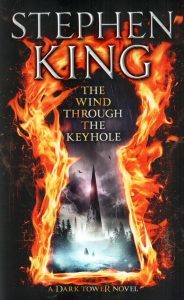 This review features one major spoiler for the series yet is referenced in the novel’s forward by King himself and a few minor spoilers.
This review features one major spoiler for the series yet is referenced in the novel’s forward by King himself and a few minor spoilers.
When I was a wide-eyed 9-year-old, my grandfather read Stephen King’s Wizard and Glass to me, the book that chronologically precedes this entry. I remember adoring those times and they remain one of my most beloved memories. A train that challenged its passengers to riddles? It was amazing. Instead of that book, I decided to re-experience this narrative as an older, wiser and uglier person.
Here, the Gunslinger Roland presents a tale to his ka-tet (mid-world terminology for his crew) about a younger Roland who had just received his guns and the esteemed title of Gunslinger.
“None of us can sleep,” Jake said. “So tell us a story.”
Many years prior he meets a young lad called Bill who is about the age I was when my grandfather would read to me. Things are not looking great for Bill at present. His father has just been brutally murdered by a skin-man. This being is similar to what we are aware of through the myths and stories of werewolves but this version can change into many different animals as and when it deems necessary, such as a bear or a crocodile. This nightmare of a being has savagely attacked and mutilated far too many people in this quaint little town. From the minors to the working folk. Nobody is excluded from this creature’s wrath.
The skin-changer is the reason that 16-year-old Roland and his gunslinger companion Jamie DeCurry are here. They have been assigned a task to find and eliminate this threat. Bill escaped the massacre and witnessed the beast in its changed, grotesque form. Roland wishes to question the young gentleman but if things couldn’t get any worse a Starkblast is on the horizon. This is a behemothic tempest and storm concoction that can obliterate all and rip entire settlements to shreds. To keep Bill calm during the event after they are safely secure Roland promises to present one of his favourite tales that his mother used to tell him when he was a little lad called The Wind Through the Keyhole.
“The stories we hear in our childhood are the ones we remember all our lives.” – That’s why I picked up this book again in memory of my grandfather as I felt it was fitting.
It’s not the finest The Dark Tower outing. I would say however though that it is definitely in the top-4. After the events of Wizard and Glass when the ka-tet leaves the land that was not Oz and before they arrive at Thunderclap and End-world, this story takes place. About 80-pages, comprising of the beginning and the end of the narrative is dedicated to the ‘current day’ Roland. These set the scene and then wrap up the happenings nicely before the gang is seen next in The Wolves of the Calla. To me, this was simply ‘bubble-gum’ reading and easy going rather than the sort of depth that comes later. It’s great to be back with Eddie, Oy, Susannah, Roland, and Jake again. The banter between the ka-tet is as fluent, tight, humorous and natural as ever. It brought me many smiles after a long time away. Oy was always one of my favourite animal companions in fantasy books up there with Ghost (ASOI&F) and Storm (F&TF). It’s a nice touch that Bully Bumblers are important throughout with the many upcoming storms.
About a 100-pages are regarding younger Roland who has wisdom beyond his years. The rest of this metaphorical story cake is the portion about the magically haunting fairy tale that features Tim Stoutheart.
The first story within a story is when Roland is sent on a mission with Jamie by his father, the legendary Gunslinger Stephen Deschain. A descendant of the line of Arthur Eld. There are a couple of neat sections here that enhance Roland’s fathers already exceptional reputation. His body is a map of scars. This is the segment that grimdark fans will enjoy the most. It features a few heads being ripped off and devoured, also absolute catastrophic bloody murderous destruction, and a sometimes confused young Gunslinger. Naturally gifted, of course, but in these early escapades lacks the finesse during certain choices yet at the same time blows the metaphorical doors off with other intense analysis that then leads to very fine decisions. He’s still a flawed work in progress and is living with the demon on his shoulder regarding the fact that he murdered his mother.
The main meat on the narrative is the story within the story within the story. This section is a dim, dark fairy tale, yet even though terrible parts happen throughout there is always an underlining element of hope. This segment reminded me of the writing King did in one of his other fantasy endevours The Eyes of the Dragon and the Yarnsworld series by self-published author Benedict Patrick. I’ll try not to say too much in detail about this part other than it features true love between family, betrayal, alcoholism, murder, a dragon, a forbidden forest, a mischevious fairy, and a couple of magicians. Readers of the main series will know one of these very well. It also features a Starkblast as do the other two storylines and to conclude, this section is enlightening, fulfilling and magical.
I truly enjoyed reading this book again and devoured it within a handful of days. King states that this entry should be placed between book #4 and #5. I agree chronologically, yes, but to be read in that order, no. The reason being is that the majority of Wizard and Glass is a Roland flashback tale from his younger days, as it The Wind Through the Keyhole. As a first time reader, I would not wish to spend approximately 900 pages away from the main narrative. I read it originally after I had completed the main series and it sat well there. I’d either read it first or last in the series if I knew what I know now. A fine entry point but also a good final goodbye to the world to those who found the finale of The Dark Tower unfulfilling, leaving a bad taste in their mouth. In the later order, it might make things seem a bit better.
Thankee Sai for reading.
Final note:- The few pages of artwork by Jae Lee, as it is with the graphic novels, are absolutely spectacular!
Purchase Stephen King’s The Wind Through the Keyhole
The post REVIEW: The Wind Through the Keyhole by Stephen King appeared first on Grimdark Magazine.
June 17, 2019
Astartes sets a new benchmark for 40k films (fan or otherwise)
40K fans have been begging creators for a really well-done production of their favourite universe featuring their favourite characters for a long, long time. As far as big productions go, first there was Ultramarines: A Warhammer 40k Movie, which was met, in general, with disappointment or lukewarm applause, despite including the voice acting chops of the legendary John Hurt (IMDB | Rotten Tomatoes). Then The Lord Inquisitor came along, which, while looking amazing, was taking producer Erasmus Brosdau and his team such a long time to deliver that the project was shelved in Feb 2018. But fret not, ye epic grimdark space opera fans, Astartes is here, and it’s absolutely, gloriously, magnificent.
First, let’s talk about the animation. It’s stunning. I watched this on my 42” TV using YouTube and it was gorgeous. Smooth and detailed. Second, let’s talk story. Astartes achieves more progress in four one minute episodes than some one hour episodes of Game of Thrones. The story moves at a cracking pace and really gets moving as the episodes fly by in whirlwinds of bolter fire. Third, the Astartes themselves. This is the first time, to me, that they have been portrayed as actual soldiers—cunning, committed, economical, confident, tactical—and not just as walking tanks shouting “For the Emperor!” as they have a cheeky wander through autocannon fire. And finally, let’s talk dialogue. There is none. Not a single word. And the production is so much better for it. We are straight into the action. There is no lengthy backstory. No long diatribes about this heretic or that. No speeches about Primarchs and the Emperor. Camaraderie between soldiers is shown in action and not hammed up bromances. It’s genius.
Without further ado, I give you Astartes. I’ll keep dropping new episodes in here as I see them pop up, but make sure you subscribe to their YouTube channel and their Patreon as I have a feeling that wherever the creators are taking this, it’s going to be excellent.
Editor’s note: I couldn’t find the animator and story creator’s name. If you know it, please point me in the right direction so I can update the article.
The post Astartes sets a new benchmark for 40k films (fan or otherwise) appeared first on Grimdark Magazine.
June 11, 2019
REVIEW: The Heart of the Circle by Keren Landsman
Magic and sorcery has always fascinated me in the fantasy genre. There is something so captivating about a wizard casting fireballs or a warlock making pacts with demons and ghouls to attain more power. It was for this reason alone that I was drawn into reading Israeli author, Keren Landsman’s, The Heart of the Circle.
 Set in an alternate reality whereby magical users (sorcerers) exist, The Heart of the Circle follows the protagonist Reed, an empath, who becomes the next target of the religious extremist group, the Sons of Simeon after a brutal march for equal rights. This is further complicated by a burgeoning romance and the lackadaisical efforts of protection by the government.
Set in an alternate reality whereby magical users (sorcerers) exist, The Heart of the Circle follows the protagonist Reed, an empath, who becomes the next target of the religious extremist group, the Sons of Simeon after a brutal march for equal rights. This is further complicated by a burgeoning romance and the lackadaisical efforts of protection by the government.
A sombre and heavy tone envelopes the reader as Reed’s opening monologue brilliantly sets up this gloomy world. He states, ‘when the first murder happened we cried for a week…after the second murder, our tears were silent. The third – we stopped crying’. Landsman not only delicately reinforces the state in which her sorcerers live, but the merciless conditions in which they are treated. I was enthralled with this line and of course, this is indicative of Landsman’s writing throughout. Her skill with the world-building of this alternate reality is masterful and I found myself drawn into the sociopolitical and geopolitical aspects of this novel (even though these are mostly teased out with mere fragments littered throughout the pages).
The crux of Landsman’s novel is to Other the sorcerers akin to how Marvel Others the mutants in X-men or (more appropriately) how the mages are Othered in the Dragon Age video game series. Though unoriginal, I do enjoy social critiques in my fantasy, and Landsman expertly weaves critique betwixt her work. It adds yet another layer to this sombre tale and at times, tugs at the heartstrings. Some of it is on the nose and perhaps even awkward, but I appreciate the direction in which Landsman steered the reader. This is the perfect subject to examine during such turbulent times, and I can only encourage more writers to follow her path.
Though The Heart of the Circle works in depicting this rather fractured world, it is at times often hamstrung by a saccharine humour. Sometimes novels do require jovial tone to allow catharsis, but Landsman often interweaves snappy one-liners delivered by Reed alongside such dreadful scenes of explosions, death, and mayhem. Such break-neck transitions confused me and muddled an already salient world. This was only exacerbated by the naming conventions in The Heart of the Circle. The names of some of the characters, such as: Oleander, Blaze, River, Odelia, Aurora, Forrest, Gaia, Tempest, and Lilac feel more at home in a comic book series or a less serious text. It was difficult at times to take these characters seriously, especially when their names often referred to their sorcerous powers. This was unusual in and of itself considering the fact Landsman attempts to subvert stereotype in general.
My understanding of Landsman’s concept of magic was a little muddled as well. It may feel unfair that I’m about to criticise Landsman’s concept of magic when she’s far more interested in the social conventions and contrasting sorcerer rights alongside homosexual, trans, and racial rights. But if an author uses magic in this context (like Dragon Age), the reader must understand the nature and limits behind such magic. I understand that empaths (also known as moodifiers or derogatorily ‘moodys’) can control people’s emotions, but I never really understood how this worked. Reed never really detailed how he worked his magical transference (and if he did, it was minimal at best). The same could be said for the damuses which have the ability to see through time or even the elementalists which range from being proficient in all manner of elemental magic. Do they work like the benders in Avatar: The Last Airbender? Do the damuses have control over their visions? I’m left unsure even though there was a lot of insinuations.
Having said that, Landsman’s novel is exceptionally paced and full of intriguing characters and concepts. I do appreciate that this is situated in a vastly different part of the world and only want to read more fiction from more different points of view like this. As mentioned above, Landsman expertly weaves social and political commentary well, this being the reason I recommend this text. Though I have a few quibbles with the text, I believe these can be mostly glossed over, especially if the reader finds themselves engrossed in the plot, romance, and sorcerer battle spectacle.
Buy this book
The post REVIEW: The Heart of the Circle by Keren Landsman appeared first on Grimdark Magazine.
June 10, 2019
REVIEW: Someone Like Me by M.R. Carey
This narrative opens with Liz’s ex-husband Marc attacking her when she asks why her kids are back so late and refuses his request that they should be able go out for a meal that night with their father at this late hour. He throttles her, in an extremely violent fashion, and something in Liz changes, perhaps even takes over so that Liz is an observer in or around her own body. She stabs him in the face with a broken bottle and then returns to her normal calm and grounded self. Was it her that was that violent even though it was self-defence?
This is an exceptional psychological thriller that blew my mind. It follows four point of view perspectives in the third person. I won’t say whether or not the same character is presented in these point of views by their different personalities… but why would I write that if that wasn’t the case?
The two main characters are Liz and Fran. Liz is the loving, devoted and admirable parent who has a violent ex. For ten years she thought his apologies were legitimate as she is a decent yet blindsided lady who loved her children as any mother would. Fran is a teenager who has hallucinations, mental illness and has had a horrific ordeal when she was six years old and was kidnapped by a deranged individual for having a strange shadow. She also has an imaginary protector called Lady Jinx who is a fox, wields a sword and looks after Fran, and is one of her only friends and companions… even though it is only in her mind.
“Less like a hallucination and more like a memento mori.”
It’s very difficult to review this book without spoiling what happens. Essentially, Liz has two personalities. A Liz and a Beth. Beth is a being who has died 100’s of times in alternative universes after being murdered by Marc. Her life was almost a parallel of Liz’s with the same lover, children, habits, haunts, and lifestyle yet, as I recently read in Mark Lawrence’s One Word Kill the theory is presented that every decision you can make, in an alternate universe your choice would have a differentiating outcome. Beth crosses worlds after death and haunts Liz. Wanting to take over and do what she wanted to do to her universe’s Marc and raise the kids she lost the way she would. It’s deep, haunting and a little bit mind-bending.
There aren’t many main characters in this. It is almost entirely focused on the main two players who I’ve mentioned’s life and families. We have Zac who stands up for Fran at school after protecting her when she’s called ‘Freaky Fran’. Molly, Zac’s sister, is a hyper 6-year-old who has the imagination of the finest writers and the way she questions all would put politicians to shame. There is also Fran’s awesome father Gil who is the epitome of how a single father should be, without taking into consideration that his daughter sees changes in her reality as frequent as she visits her school.
This book was really interesting and intriguing for me and I’d love to know what research M.R. Carey did to get the insight into his characters’ minds. I’ve suffered from mental illness and I’ve seen the ghosts or the shadows at the end of the room or by the door that shouldn’t be there. I personally have changed plains whilst still being awake in this world. I’ve heard voices of friends in my mind telling me stuff even though I’ve not seen them for five years. These experiences are included here but heightened sevenfold so I’m interested how true what is mentioned here is accurate in real life cases. But I digress, this is an absolutely spectacular book that has far too low a rating on Goodreads for its quality. I’ll be checking out his past and future works as soon as I can.
Buy Someone Like Me
The post REVIEW: Someone Like Me by M.R. Carey appeared first on Grimdark Magazine.
June 2, 2019
REVIEW: Crowfall by Ed McDonald
Our team were so excited for book three of the Raven’s Mark series that we’re going to do a GdM first and publish two reviews of this book. Below you’ll find reviews by Durand Welsh (who reviewed Blackwing and Ravencry here on GdM) and James Tivendale. Warning: being the third book in a trilogy, there is obviously a few spoilers int he words below, so read warily oh thee fantasy traveller.
Review 1: Durand
Ed McDonald’s Raven’s Mark series is played out against the backdrop of an endless war between humanity and the Deep Kings, god-like beings intent on the subjugation of all mankind. In their fight, humanity is aided by the Nameless, wizards who have themselves ascended to near god-like status but whose ultimate aims are inscrutable.
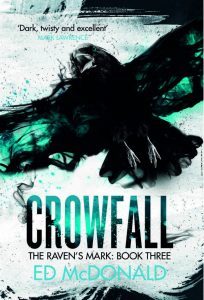 Crowfall is the third novel, and as in the previous two novels, the protagonist is Captain Ryhalt Galharrow, an enforcer of the Nameless called Crowfoot. Over six years have passed since the previous novel, Ravencry, and Ryhalt is now eking out a hermit’s existence deep within the magical wasteland called the Misery. His exposure to the Endless Devoid, the Misery’s heart, has warped him in both body and soul. He now has superhuman physical gifts and has acquired the unique ability to navigate the Misery without astronomical tools, but he also suffers from hallucinatory visions and the slow corruption of his humanity.
Crowfall is the third novel, and as in the previous two novels, the protagonist is Captain Ryhalt Galharrow, an enforcer of the Nameless called Crowfoot. Over six years have passed since the previous novel, Ravencry, and Ryhalt is now eking out a hermit’s existence deep within the magical wasteland called the Misery. His exposure to the Endless Devoid, the Misery’s heart, has warped him in both body and soul. He now has superhuman physical gifts and has acquired the unique ability to navigate the Misery without astronomical tools, but he also suffers from hallucinatory visions and the slow corruption of his humanity.
His self-imposed exile is a routine, directionless one, until an emissary from the Nameless arrives to inform him that Crowfoot, grievously weakened in a previous battle with the Deep Kings, has forged a new apocalyptic weapon that is the last hope for the war. Galharrow must journey once more to the city of Valengrad to answer the summons and execute Crowfoot’s plan.
Suffice to say, what follows isn’t straightforward, and no end of complications arise. Galharrow’s old friends are embroiled in dangerous troubles of their own, the current Marshal of Valengrad despises him, and someone has been murdering Crowfoot’s other captains. A few bloody fights later, Galharrow has cleared a path through to the first major task in Crowfoot’s plan: the requisition of the heart of an eons-dead monstrosity referred to simply as the ice fiend. The fiend, as befits a creature whose heart can power a doomsday device, is located in a frozen waste accessible only through the Duskland Gate, a portal harnessing the power of death itself. Tough going, and it only gets tougher.
The other Nameless, as Galharrow discovers shortly after arriving in Valengrad, have also sent forth their own representatives into the city: Nall has sent Valiya, Galharrow’s one-time romantic interest, but now gifted with the abilities of a mathematical savant; the Lady of Waves has sent her captain, the coldly efficient killer North; Shallowgrave has sent the inhuman soldiers known as the Marble Guard.
Ostensibly, the Nameless are united in a last ditch attempt to save humanity, but Galharrow is a cynical man at the best of times, and he knows that betrayal is only a matter of time. Even Amaira, who he thinks of as one would a daughter, is now one of Crowfoot’s captains, and the bonds to her Nameless master overshadow the old ties he and her once shared. Then there is Ezabeth, Galharrow’s one true love, lost somewhere in the magical aether of the Light and an unknown quantity in the upcoming final battle with the Deep Kings.
Amaira, Ezabeth and Valiya are familiar faces, and there is no shortage of characters from the previous novels. In addition to those already cited, returning readers will recognise Maldon, Dantry, Nenn (or at least her ghost), Tnota and others.
In fact much of Crowfall’s conflict stems from Galharrow having to navigate relationships that were established in the previous books but which now must be dealt with on new terms. Tnota’s loyalty to him comes into conflict with Tnota’s newfound domestic life; his former comrades Dantry and Maldon are wanted fugitives with an unknown agenda; Valiya is professional and emotionally distant towards him following their parting in Ravencry; Amaira is a woman grown with no need of his protection.
My only gripe here is that the quantity of characters from past books doesn’t give each of them a lot of room to develop. This is understandable, as McDonald has to cram two books worth of characters plus a cast of new characters into the new book, but at times the characterisation feels pared down.
That, though, is a minor criticism. On the whole, I thoroughly enjoyed Crowfall. While Blackwing is my favourite of the three Raven’s Mark novels – the prose, dialogue and world are a bit fresher and the cast of characters more tightly circumscribed – I preferred Crowfall to Ravencry. Crowfall reprises Blackwing’s darkness and sense of impending doom, and is as bleak and grim a novel as fantasy offers.
While I think it would be possible for a reader to jump in with this novel, it would be nowhere near as rewarding an experience as beginning with Blackwing. One of the pleasures of this novel is seeing the culmination of Galharrow’s journey, and witnessing how events in previous novels have changed him and influenced his destiny. Crowfall is certainly a worthy resolution to Galharrow’s tale, and if you’ve read the previous two novels, you won’t be disappointed.
Review 2: James
“Another Heart of the Void? The sky is shattered, the rain sends men mad. Even the geese are trying to eat us. What the fuck do we have to gain by unleashing that kind of power again?”
I received an advanced reading copy of Crowfall in exchange for an honest review. I would like to thank Ed McDonald and Ace Books for the opportunity. May contain spoilers for Ravencry.
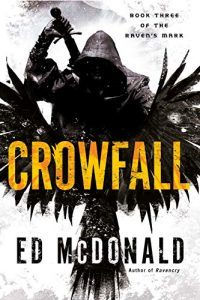 Crowfall is an engaging and thrilling final chapter to an excellent dark fantasy trilogy. I have seen the Raven’s Mark series referred to as Grimheart. I thought that tag was a joke initially but the more I have thought about it the more fitting the label actually seems. However chaotic, gruesome, or terrible things may seem in this world there are always underlining currents of hope and love.
Crowfall is an engaging and thrilling final chapter to an excellent dark fantasy trilogy. I have seen the Raven’s Mark series referred to as Grimheart. I thought that tag was a joke initially but the more I have thought about it the more fitting the label actually seems. However chaotic, gruesome, or terrible things may seem in this world there are always underlining currents of hope and love.
This narrative is set six years after the conclusion of Ravencry when Shavada was blasted from the grandspire’s roof and the city was saved. We see a very different Ryhalt Galharrow. Since that event, the Blackwing Captain has been residing in isolation in the Misery. Eating the monstrosities that lurk within the land, conversing with the ghosts that haunt it, and every night returning to the Always House, a comfortable country cottage, seemingly unaffected by the magic of the Misery except that it resets once a day. The reason for Galharrow’s need to be alone and in the Misery of all places is unclear but the Misery has changed him and become a part of him. He’s become an expert navigator and converses with the Misery frequently. He is even referred to as the ‘son of the Misery.’ Although he’s been living as a hermit it seems everybody wants Galharrow eradicated, from the Nameless to the men of the Citadel. If that wasn’t bad enough, the Deep Kings now have an Emperor and are looking to march on the living with their Drudge army. Galharrow knows he has an important part to play in the upcoming war.
I’ve always enjoyed following Galharrow’s first-person perspective. He’s such a likable character throughout the series although he really shouldn’t be. In Ravencry he was traipsing around the fringes of madness however for parts of Crowfall he is as good as insane. It’s written and presented in expert fashion and as a reader, I tried to analyse reality and exactly what was going on in Galharrow’s mind.
The characters that have been crafted by McDonald are brilliant and jump off the page here. Series mainstays such as the aging navigator Tnota and no-nosed violence adoring Major Nenn (even though she’s dead) are as important as ever in Crowfall. Joining these and other players such as Dantry, Maldon, and Valiya are new and influential characters such as sharp-eyed shooter North and marble guardian, First.
I’m not sure what the technical phrasing is but the way McDonald wrote led me to create amazing visuals of all the places frequented and portraits of all the characters in my mind. I was so engaged that I almost felt that I was there alongside Galharrow throughout his adventures and struggles. I was fully invested in him and the narrative as a whole.
I won’t divulge too much information about what takes place in Crowfall other than that there are so many standout moments and stunning set-pieces. As the conclusion to one of my favourite recent fantasy series, I was not disappointed by any aspect. In a few years time when fans of dark fantasy think of standout characters in the genre, Galharrow is a name that will be uttered alongside Jorg, Geralt, and Locke Lamora. The finale was epic, lasted for about twenty percent of the novel and often left me breathless with the battles, showdowns, twists, awesome reveals, and betrayals. Essentially it had everything I required on my epic fantasy bingo card. Blackwing remains one of my favourite ever books. The following two books in the series never quite reached the lofty heights but are still pretty damn awesome. This is a series that needs to be read by all dark fantasy and grimdark fans.
Purchase a copy
The post REVIEW: Crowfall by Ed McDonald appeared first on Grimdark Magazine.

